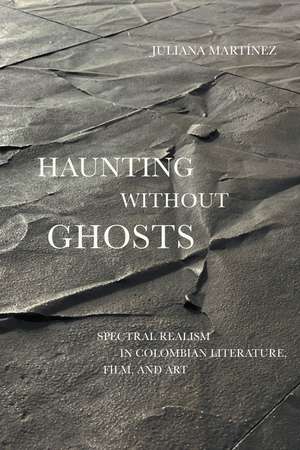Haunting Without Ghosts: Spectral Realism in Colombian Literature, Film, and Art: Border Hispanisms
Autor Juliana Martínezen Limba Engleză Hardback – dec 2020
For half a century, cultural production in Colombia has labored under the weight of magical realism—above all, the works of Gabriel García Márquez—where ghosts told stories about the country’s violent past and warned against a similarly gruesome future.
Decades later, the story of violence in Colombia is no less horrific, but the critical resources of magical realism are depleted. In their wake comes "spectral realism." Juliana Martínez argues that recent Colombian novelists, filmmakers, and artists—from Evelio Rosero and William Vega to Beatriz González and Erika Diettes—share a formal and thematic concern with the spectral but shift the focus from what the ghost is toward what the specter does. These works do not speak of ghosts. Instead, they use the specter to destabilize reality by challenging the authority of human vision and historical chronology.
By introducing the spectral into their work, these artists decommodify well-worn modes of representing violence and create a critical space from which to seek justice for the dead and disappeared. A Colombia-based study, Haunting without Ghosts brings powerful insight to the politics and ethics of spectral aesthetics, relevant for a variety of sociohistorical contexts.
Preț: 359.07 lei
Nou
Puncte Express: 539
Preț estimativ în valută:
68.71€ • 71.30$ • 57.43£
68.71€ • 71.30$ • 57.43£
Carte tipărită la comandă
Livrare economică 18 martie-01 aprilie
Preluare comenzi: 021 569.72.76
Specificații
ISBN-13: 9781477321713
ISBN-10: 1477321713
Pagini: 232
Ilustrații: 18 b&w photos
Dimensiuni: 152 x 229 x 25 mm
Greutate: 0.51 kg
Editura: University of Texas Press
Colecția University of Texas Press
Seria Border Hispanisms
ISBN-10: 1477321713
Pagini: 232
Ilustrații: 18 b&w photos
Dimensiuni: 152 x 229 x 25 mm
Greutate: 0.51 kg
Editura: University of Texas Press
Colecția University of Texas Press
Seria Border Hispanisms
Notă biografică
Juliana Martínez is an assistant professor in the Department of World Languages and Cultures at American University, in Washington, DC. Her research, focused on the intersection of violence and body politics in Latin America, has appeared in numerous journals, and she is a coeditor of the 2019 special issue "Violent Tales: Cultural Representation in Colombia and Mexico” for Revista de Estudios Hispánicos. She regularly teaches courses on Latin American literature, film, and history; narratives of violence (particularly in Colombia and Mexico); gender and sexuality; and women writers in Latin America. Martínez has also written for popular venues, including the Guardian and the Huffington Post.
Cuprins
Acknowledgments
Introduction
Chapter 1. Evelio Rosero’s Spectral Landscapes of Disappearance
Chapter 2. Beyond Vision: Haptic Perception and Contested Spaces in the Films of William Vega, Jorge Forero, and Felipe Guerrero
Chapter 3. The Revenants: Deferred Burials and Suspended Mourning in the Works of Juan Manuel Echavarría, Beatriz González, and Erika Diettes
Epilogue
Notes
Works Cited
Index
Introduction
Chapter 1. Evelio Rosero’s Spectral Landscapes of Disappearance
Chapter 2. Beyond Vision: Haptic Perception and Contested Spaces in the Films of William Vega, Jorge Forero, and Felipe Guerrero
Chapter 3. The Revenants: Deferred Burials and Suspended Mourning in the Works of Juan Manuel Echavarría, Beatriz González, and Erika Diettes
Epilogue
Notes
Works Cited
Index
Recenzii
[Haunting without Ghosts] is a book written with critical patience to regard the disturbing presence of the specters of enforced disappearance, the violently and intentionally silenced or erased from Colombian history...Haunting without Ghosts not only can teach scholars, but also cultural practitioners who wish to deal with the ethical issues of the representation of historical and structural violence...It is a book to take to heart the harrowing muted cries of the voiceless.
Descriere
An ambitious critical account of "spectral realism," a new, politically charged strain of literature, film, and art that responds to Colombia's drug wars, paramilitary violence, and resulting demands for justice.







